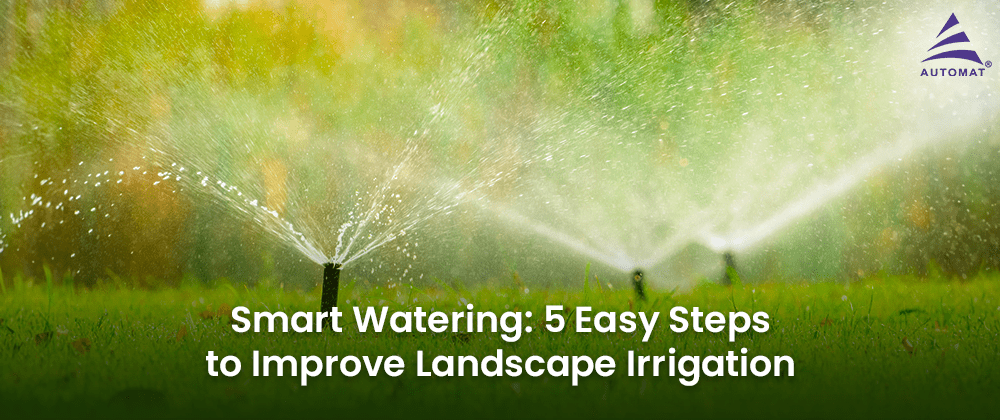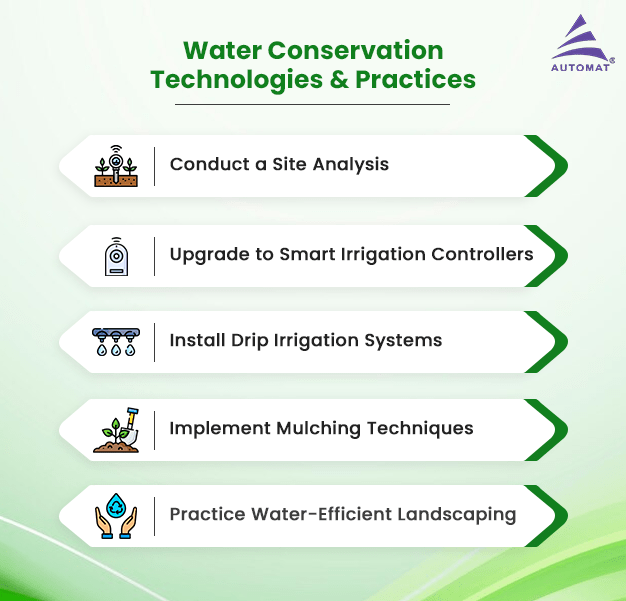
In the realm of landscape maintenance, efficient water usage is paramount. Water scarcity, environmental concerns, and rising costs make it imperative for homeowners and landscapers alike to adopt smart watering practices. Fortunately, advancements in irrigation technology and simple adjustments in watering habits can lead to significant improvements in water conservation and landscape health. In this guide, we’ll explore five easy steps to enhance landscape irrigation and promote sustainability.
Water Conservation Technologies and Practices
1. Conduct a Site Analysis
Before implementing any changes to your irrigation system, it’s essential to understand your landscape’s specific needs. Conduct a thorough site analysis to identify factors such as soil type, sun exposure, plant types, and slope. This information will help you tailor your watering schedule to match the unique requirements of different areas within your landscape. Consider using soil moisture sensors or consulting with a landscaping professional to gather accurate data.
2. Upgrade to Smart Irrigation Controllers
Traditional irrigation controllers operate on preset schedules, often leading to overwatering or underwatering. Smart irrigation controllers, on the other hand, utilize weather data, soil moisture levels, and plant water requirements to adjust watering schedules dynamically. These controllers can be programmed remotely via smartphone apps, allowing users to monitor and control water irrigation systems from anywhere. Investing in a smart controller can significantly reduce water waste and optimize irrigation efficiency.
3. Install Drip Irrigation Systems
Drip irrigation systems deliver water directly to the root zone of plants, minimizing evaporation and runoff compared to traditional sprinkler systems. By reducing water waste, drip irrigation promotes healthier plant growth and conserves water resources. Additionally, drip systems can be customized to deliver precise amounts of water to each plant, ensuring optimal hydration without excess runoff. Consider retrofitting your existing irrigation system with drip emitters or installing a new drip system for targeted watering efficiency.
Read more: 5 Steps to Sustainable Landscape Irrigation for Water Management
4. Implement Mulching Techniques
Mulching serves as a natural water conservation method by reducing soil moisture evaporation and suppressing weed growth. Organic mulches such as wood chips, straw, or shredded leaves also improve soil structure and nutrient retention, promoting healthier plant growth. Apply a layer of mulch around trees, shrubs, and garden beds to conserve moisture and reduce the frequency of watering. According to Organisation for Economic Co-operation and Development, India would face severe water constrains by 2050. Indian agriculture accounts for 90% water use due to fast-track ground water depletion and poor irrigation systems, which make its important to use techniques that can help conserve water. Mulching not only conserves water but also enhances the aesthetic appeal of your landscape.
5. Practice Water-Efficient Landscaping
Choose drought-tolerant plant species native to your region for landscaping projects, as they require less water and maintenance compared to exotic varieties. Group plants with similar water requirements together to optimize irrigation efficiency and minimize water waste. Incorporate water-saving features such as rain gardens, permeable paving, turf management strategies, and artificial turf to reduce outdoor water usage further. By designing water-efficient landscapes, you can enjoy a beautiful, sustainable outdoor environment while conserving precious water resources.

Conclusion
Improving landscape irrigation doesn’t have to be complicated. By following these five easy steps – conducting a site analysis, upgrading to smart irrigation controllers, installing drip irrigation systems, implementing mulching techniques, and practicing water-efficient landscaping – homeowners and landscapers can significantly enhance water conservation efforts while maintaining a vibrant and healthy landscape. Embracing smart watering practices not only benefits the environment but also leads to long-term cost savings and enhances the beauty of outdoor spaces. Additionally, integrating water recycling systems into irrigation setups can further enhance sustainability by reusing water resources effectively. For those looking to streamline their irrigation systems with innovative solutions, Automat World offers cutting-edge technology to optimize water usage and promote environmental responsibility.




